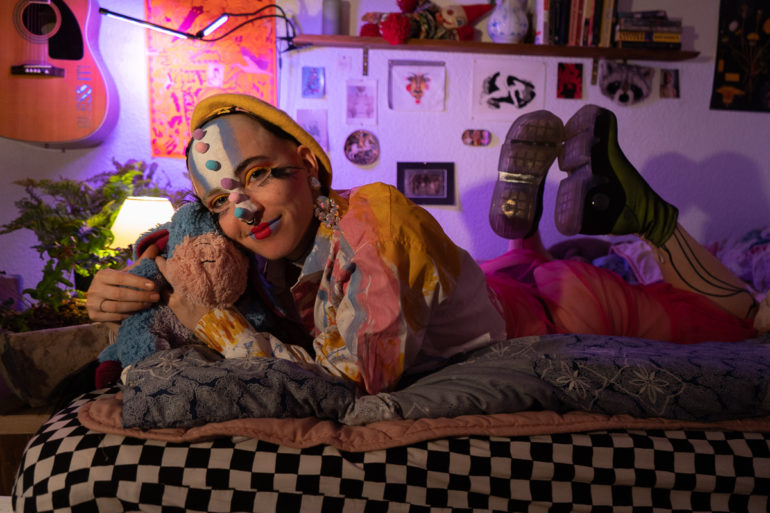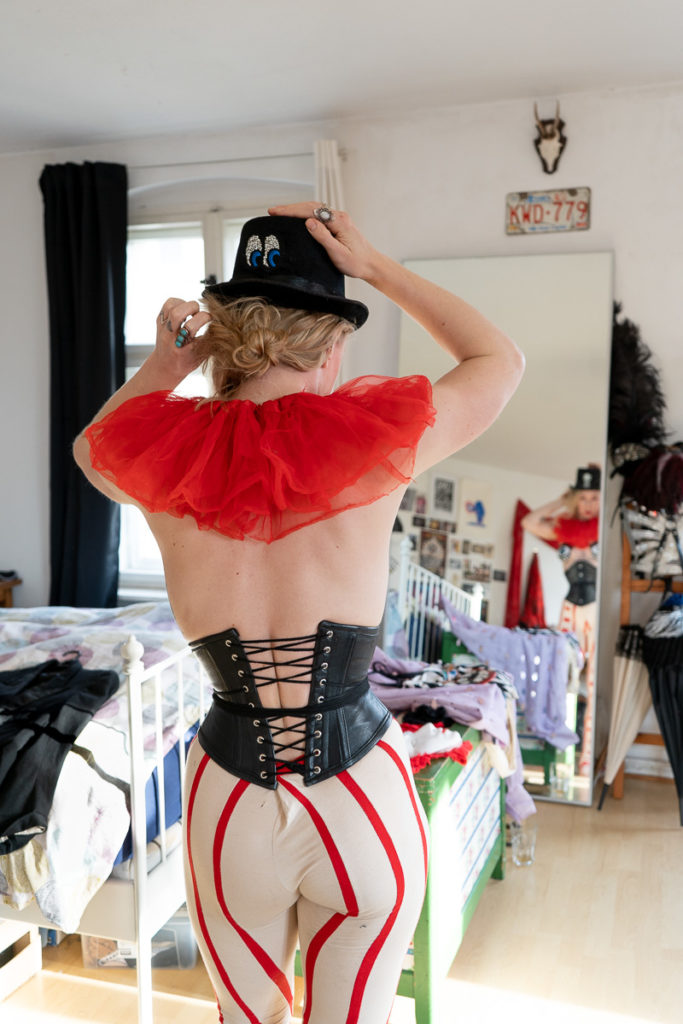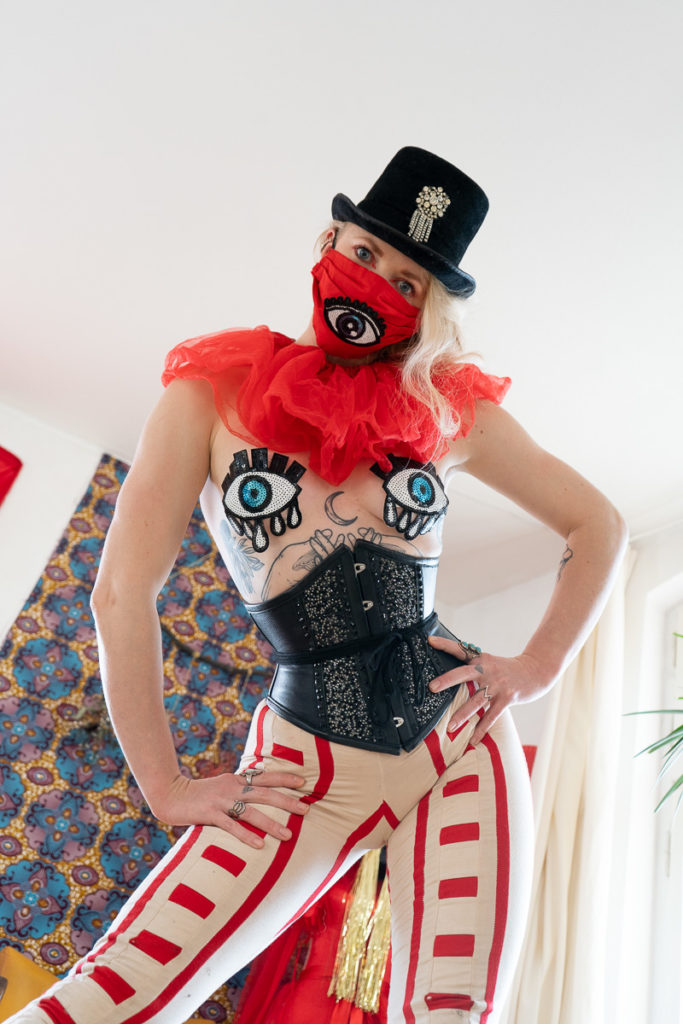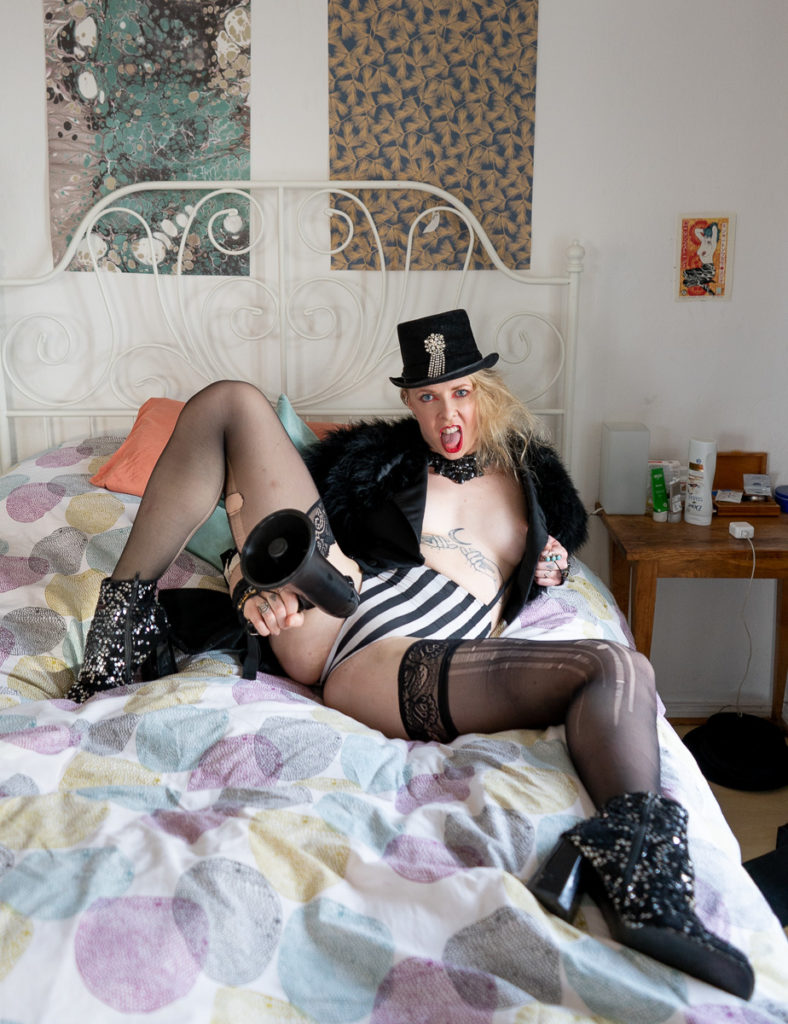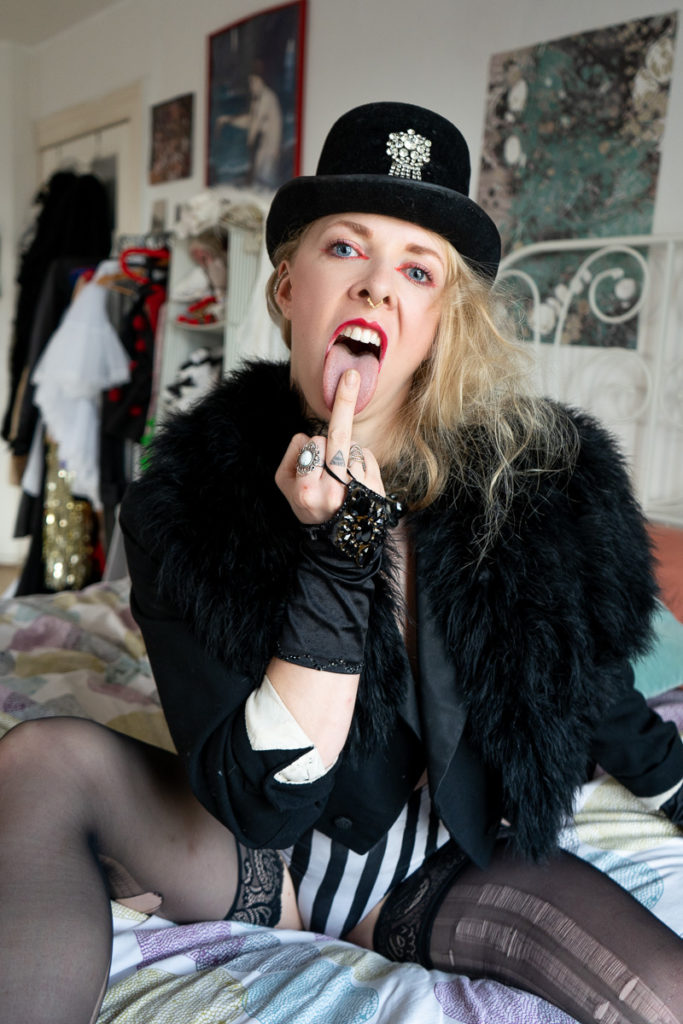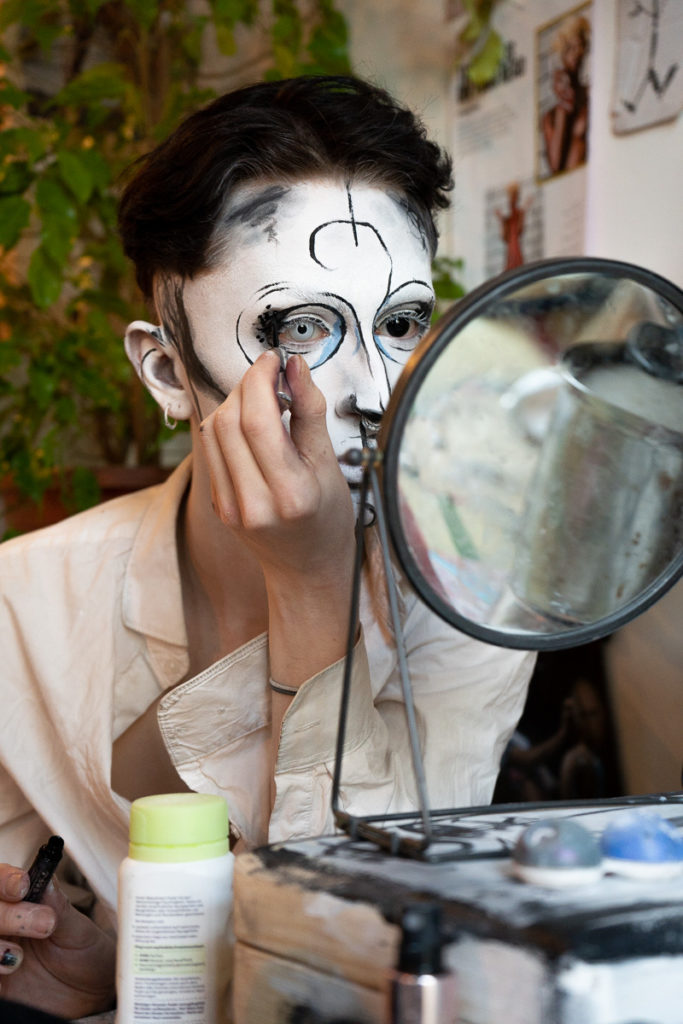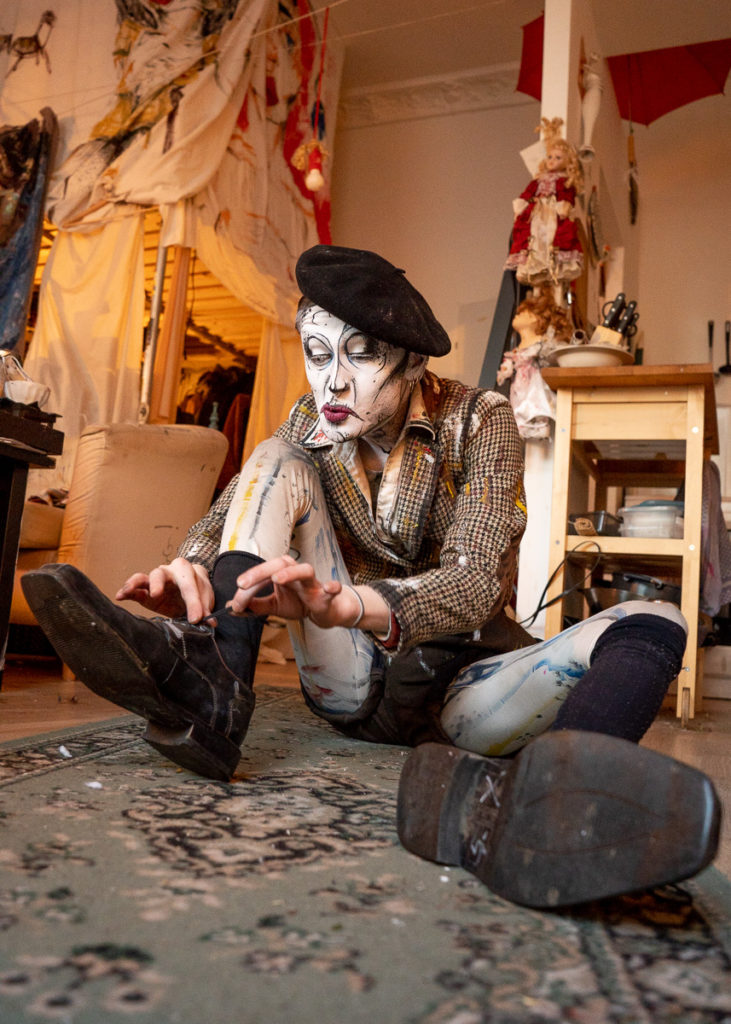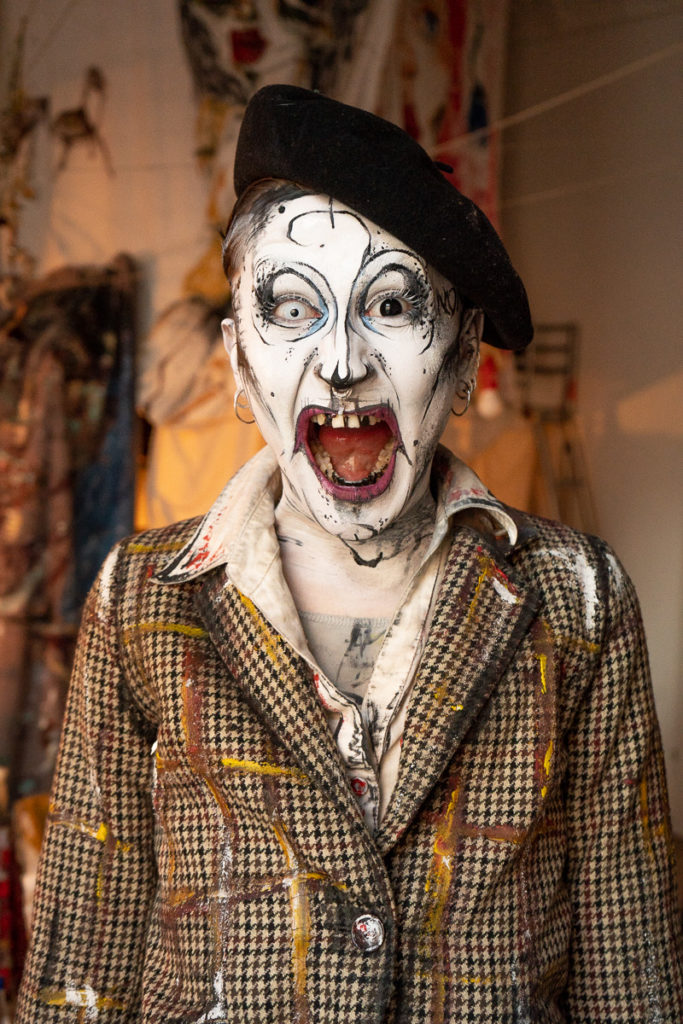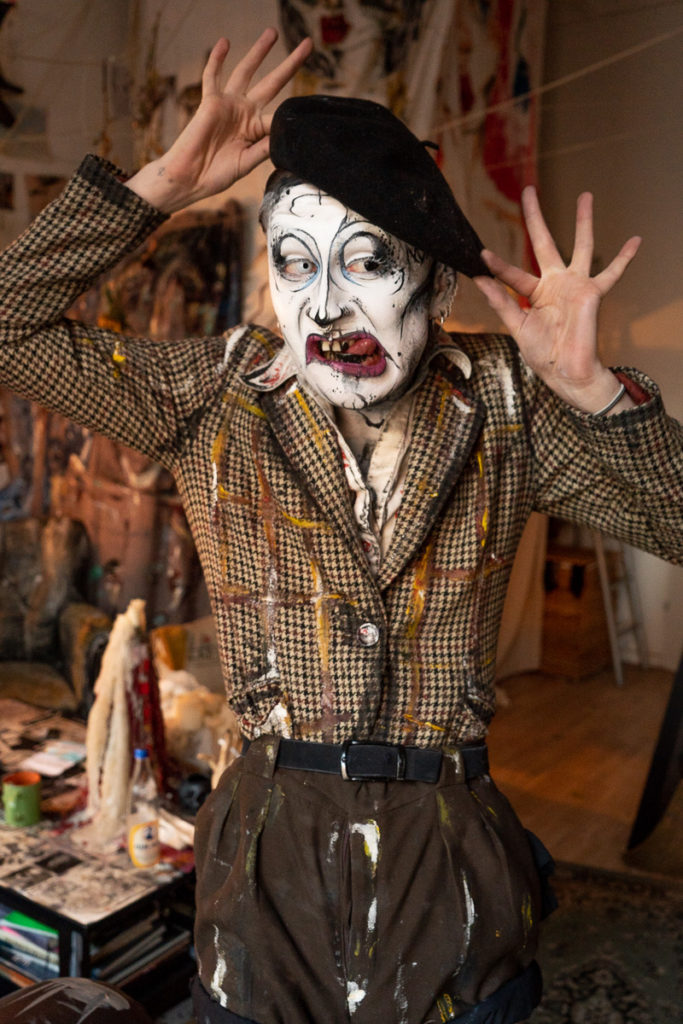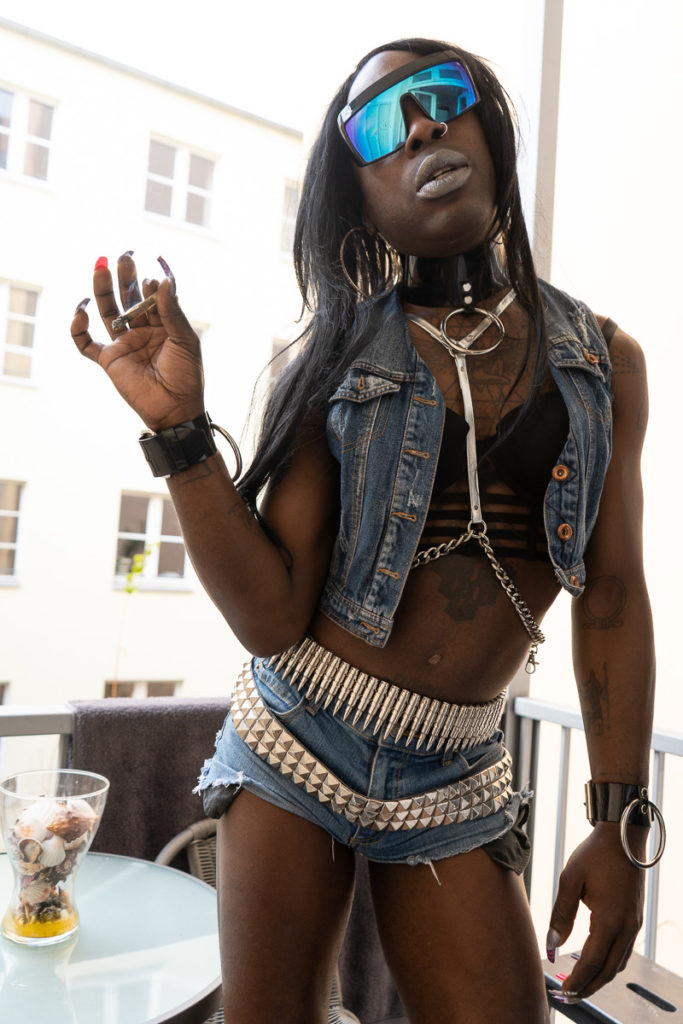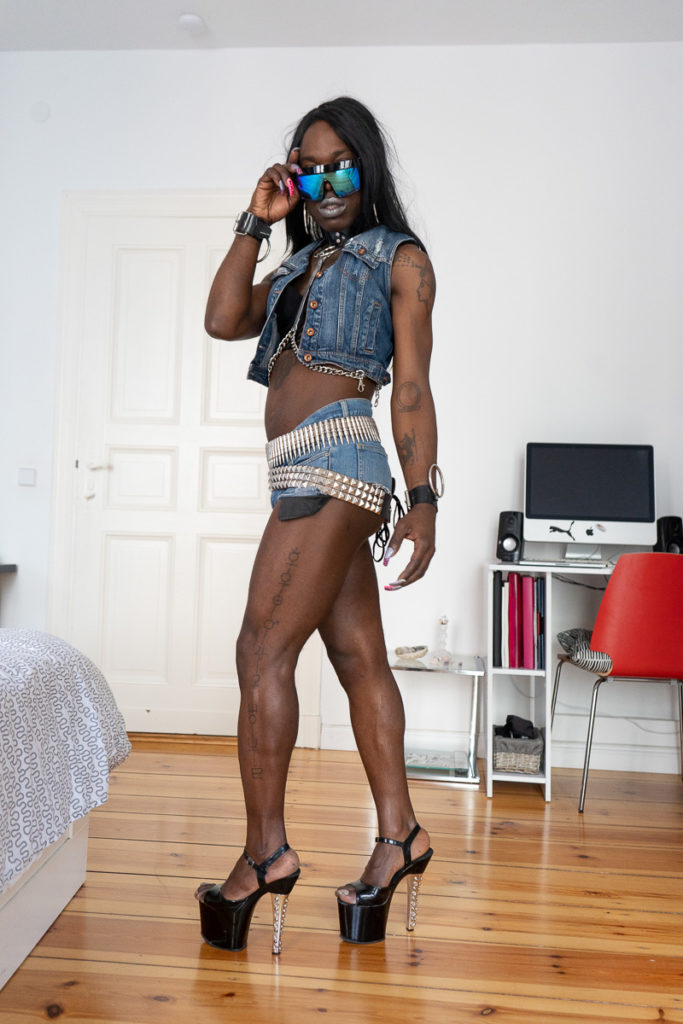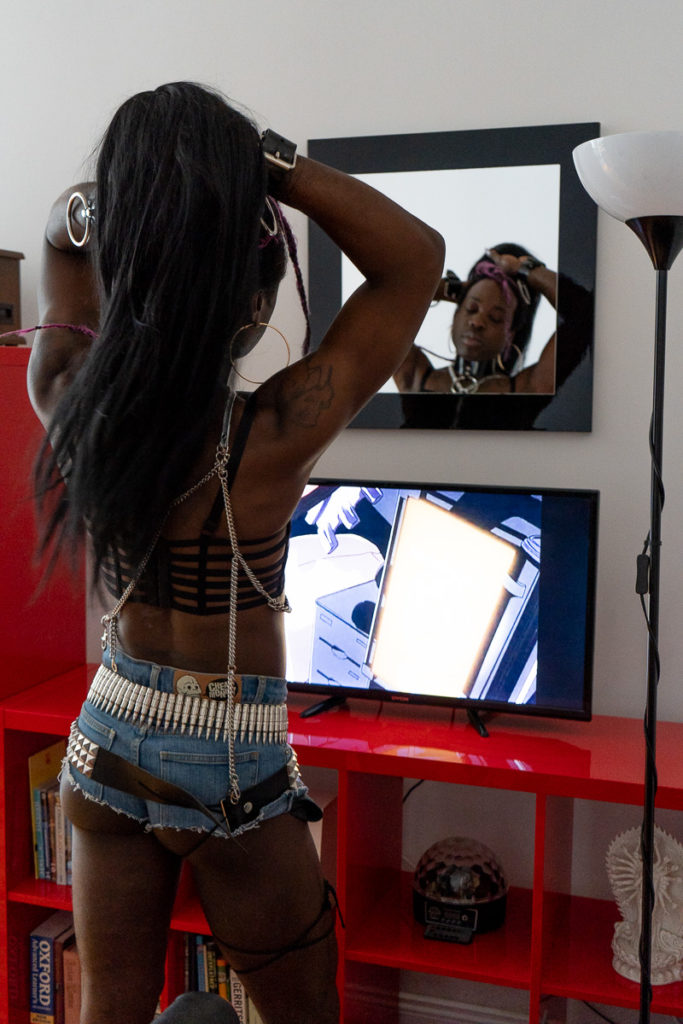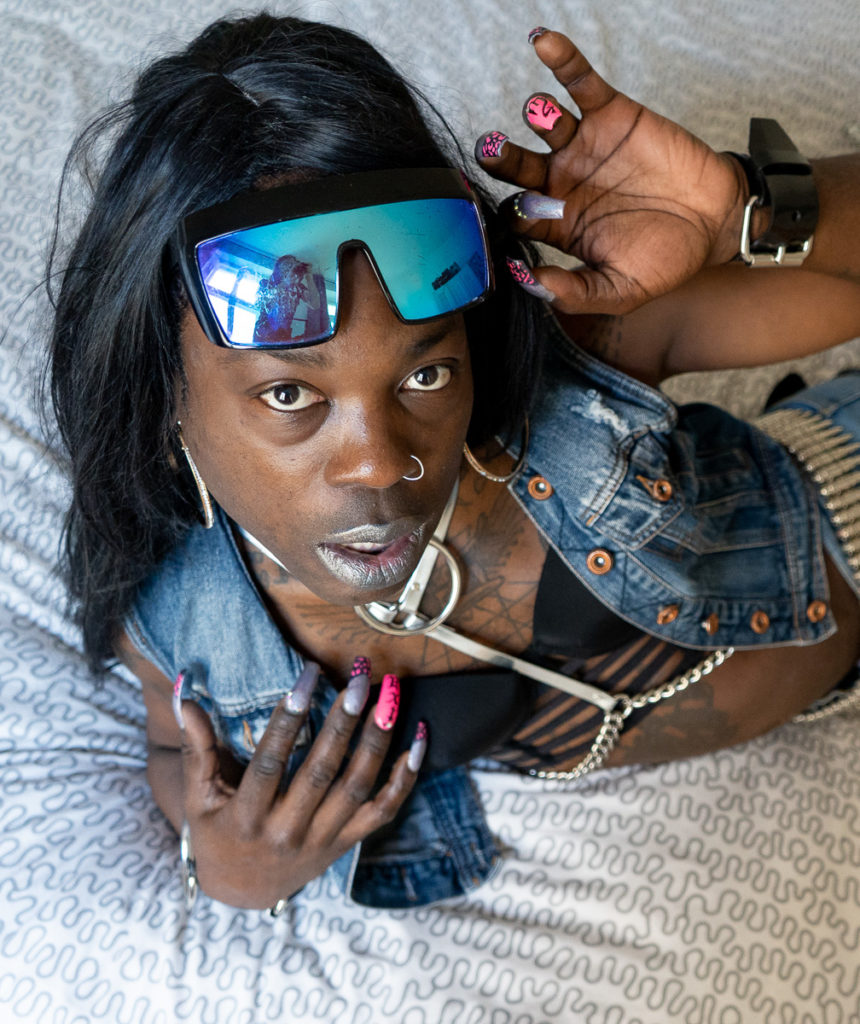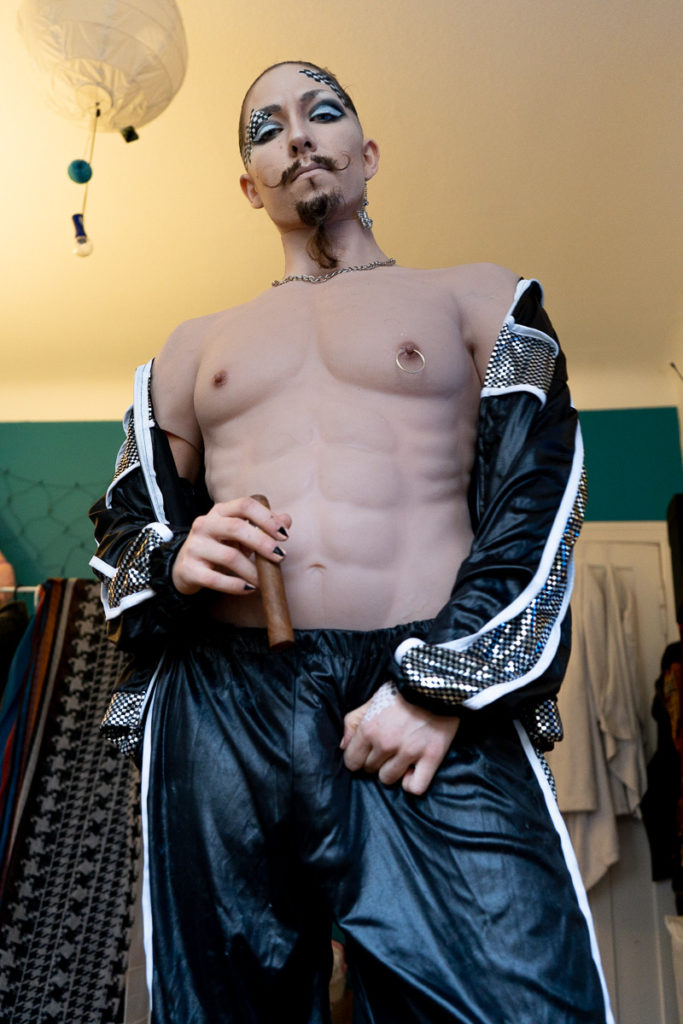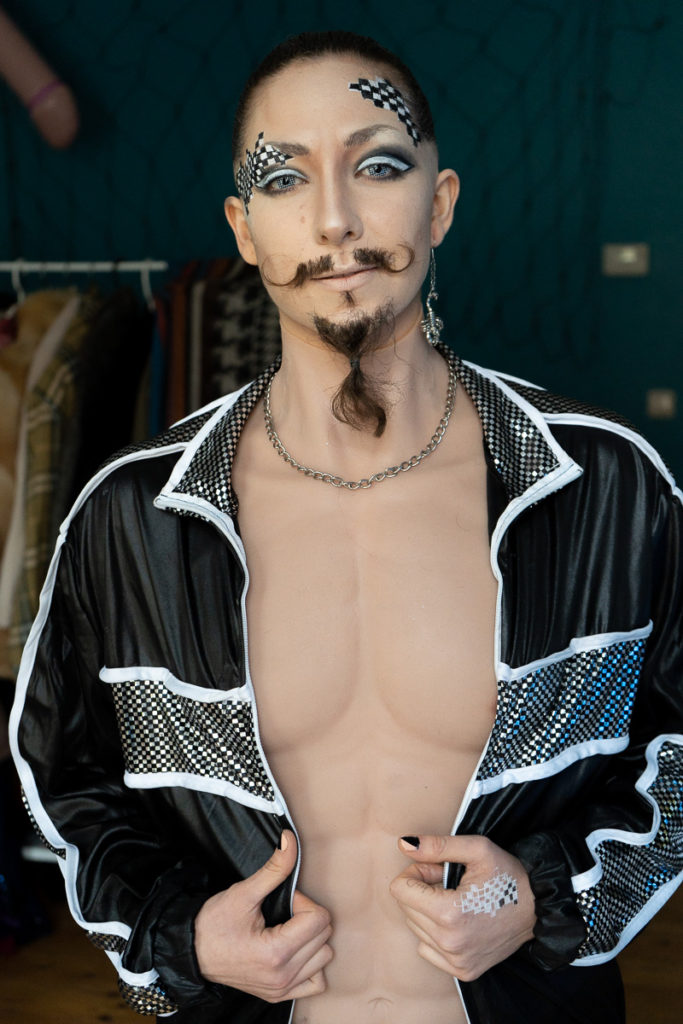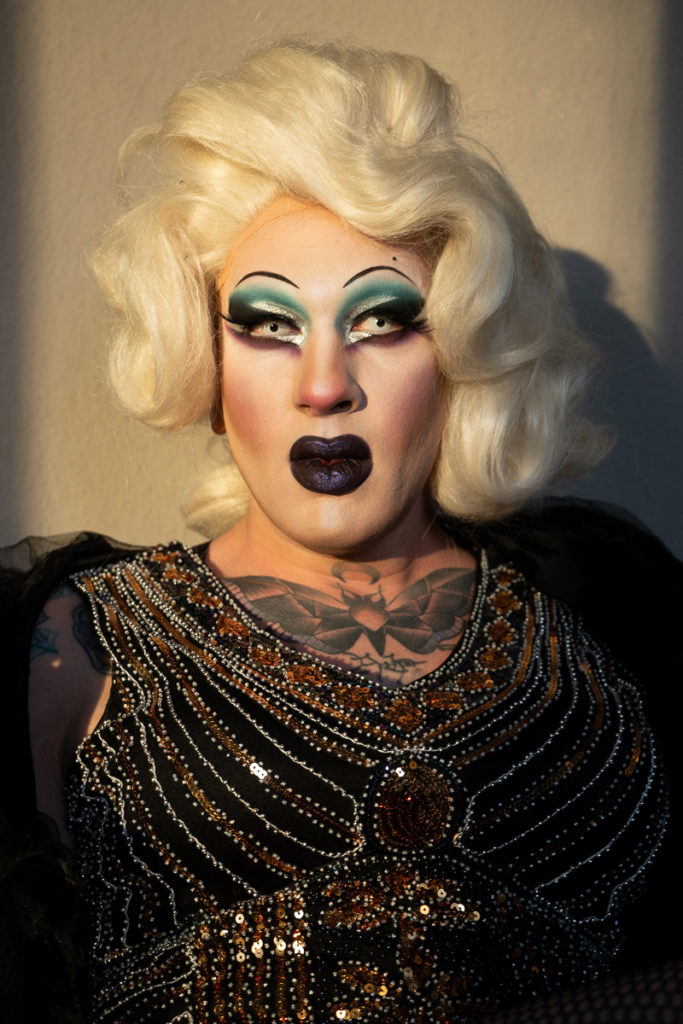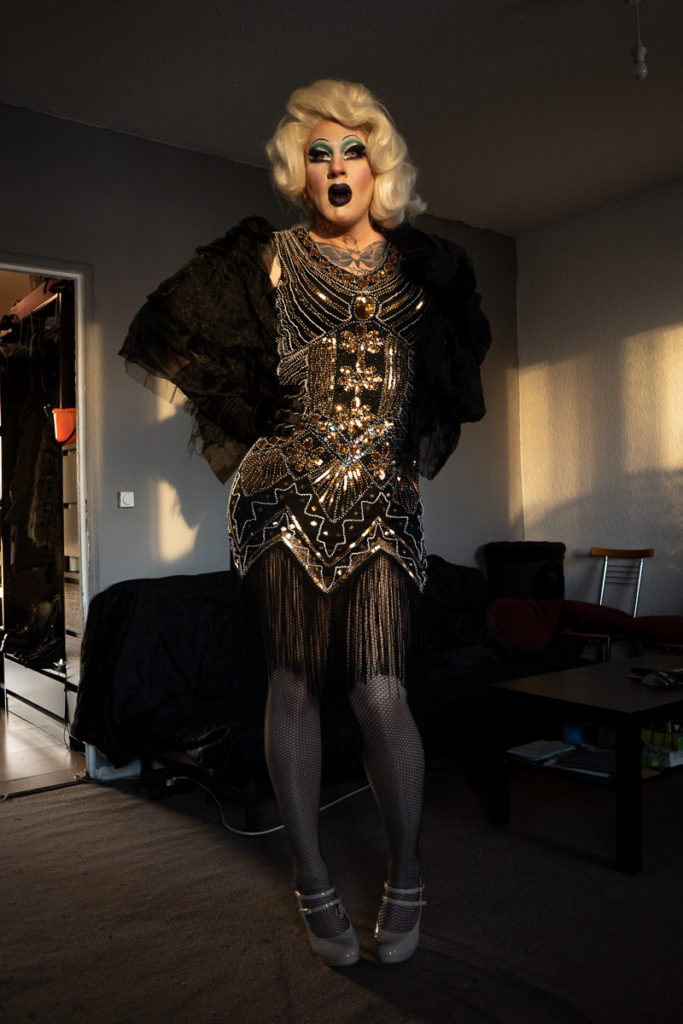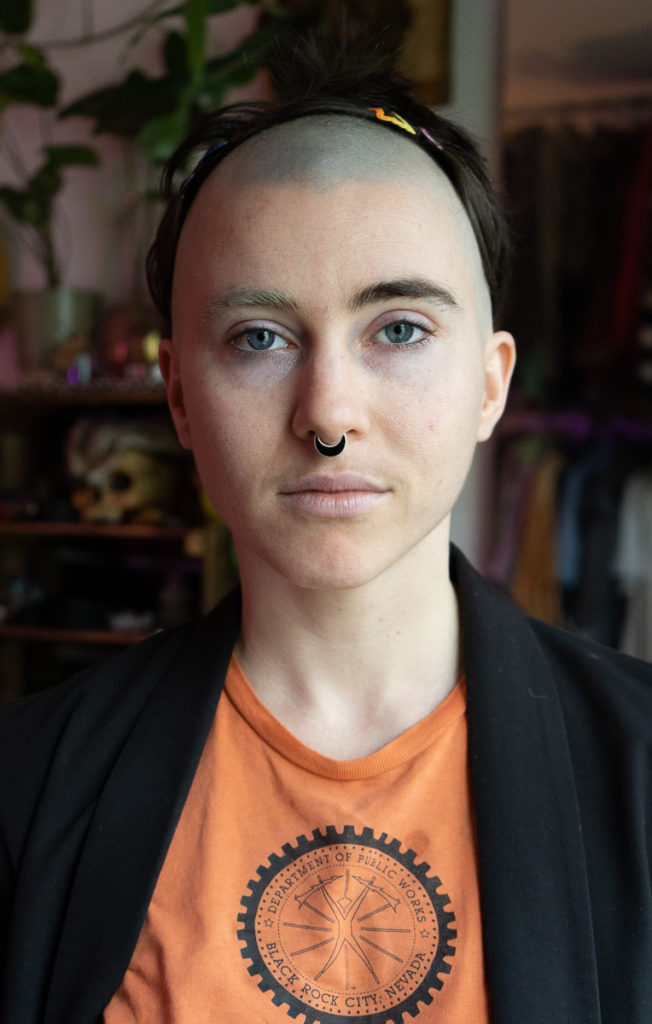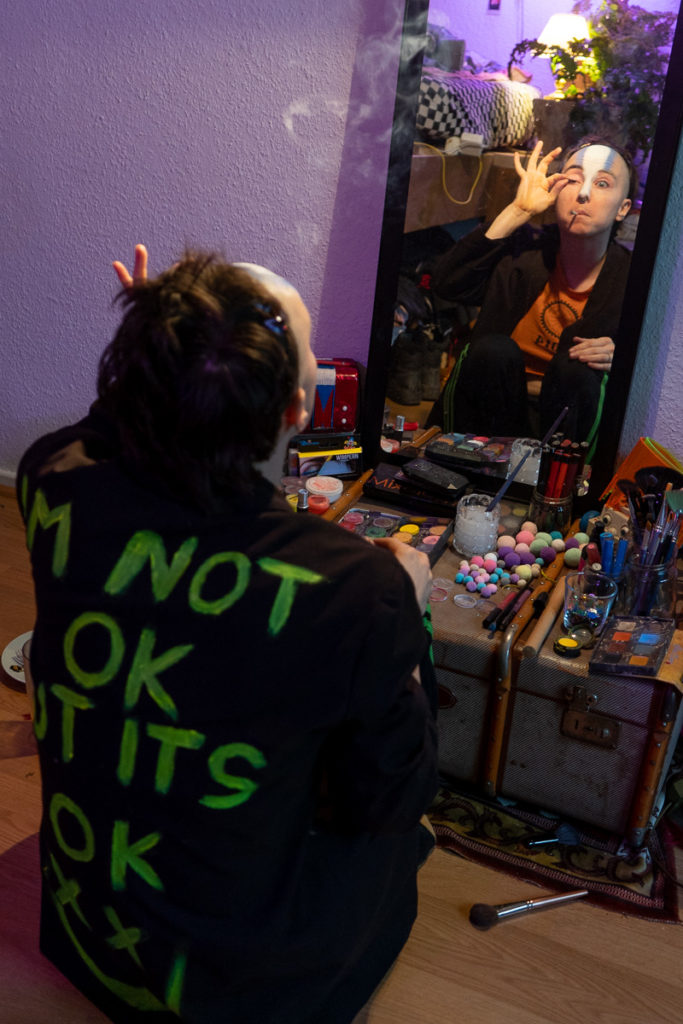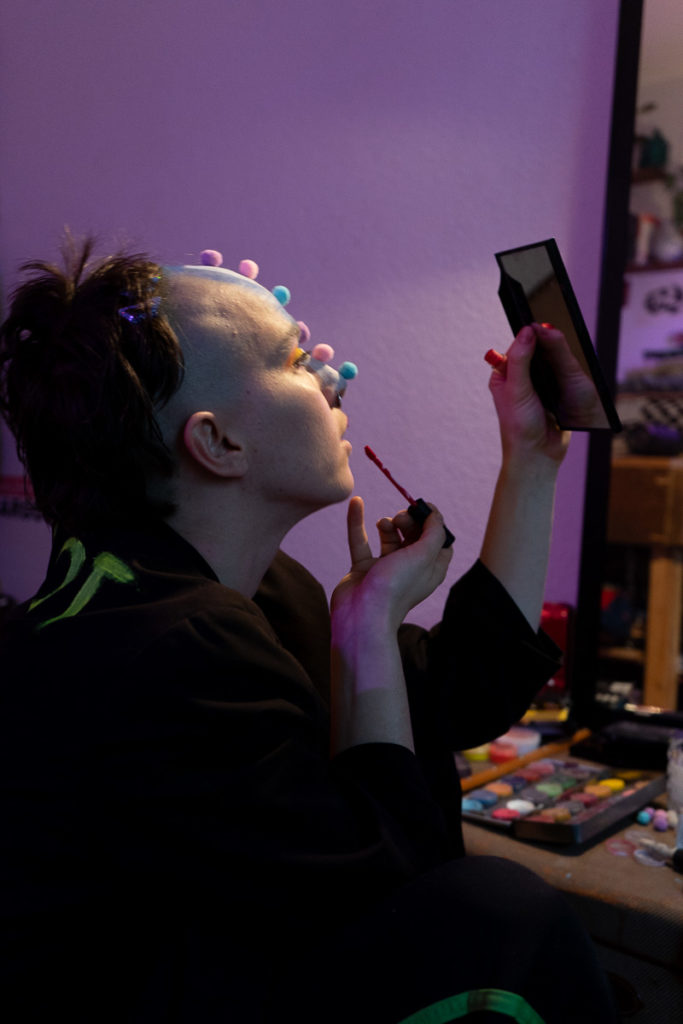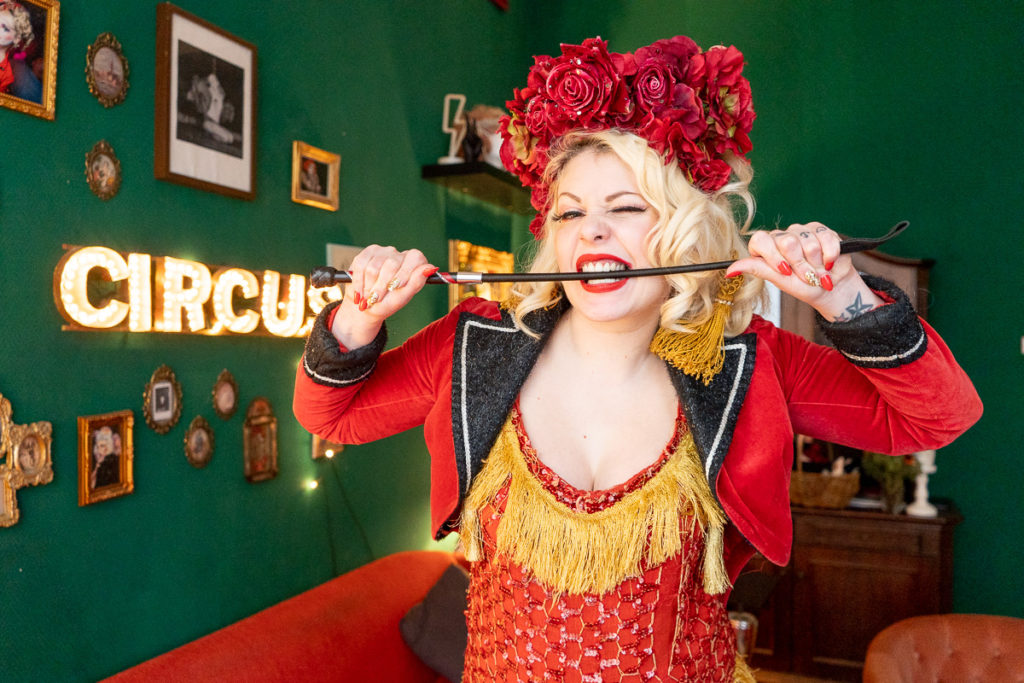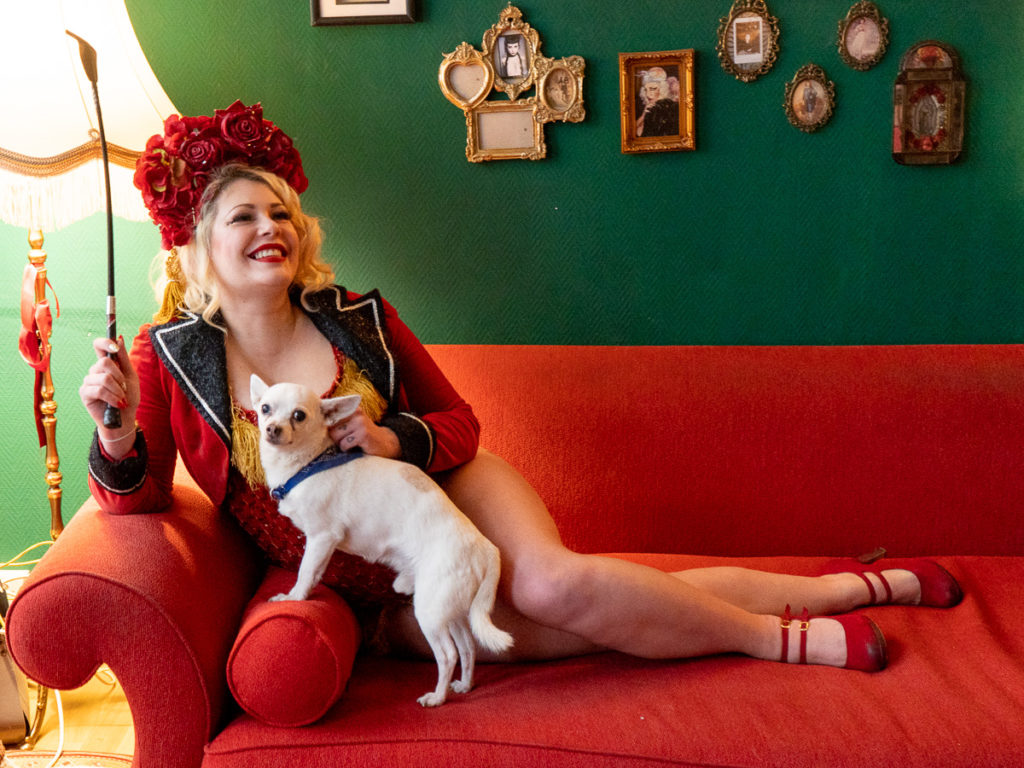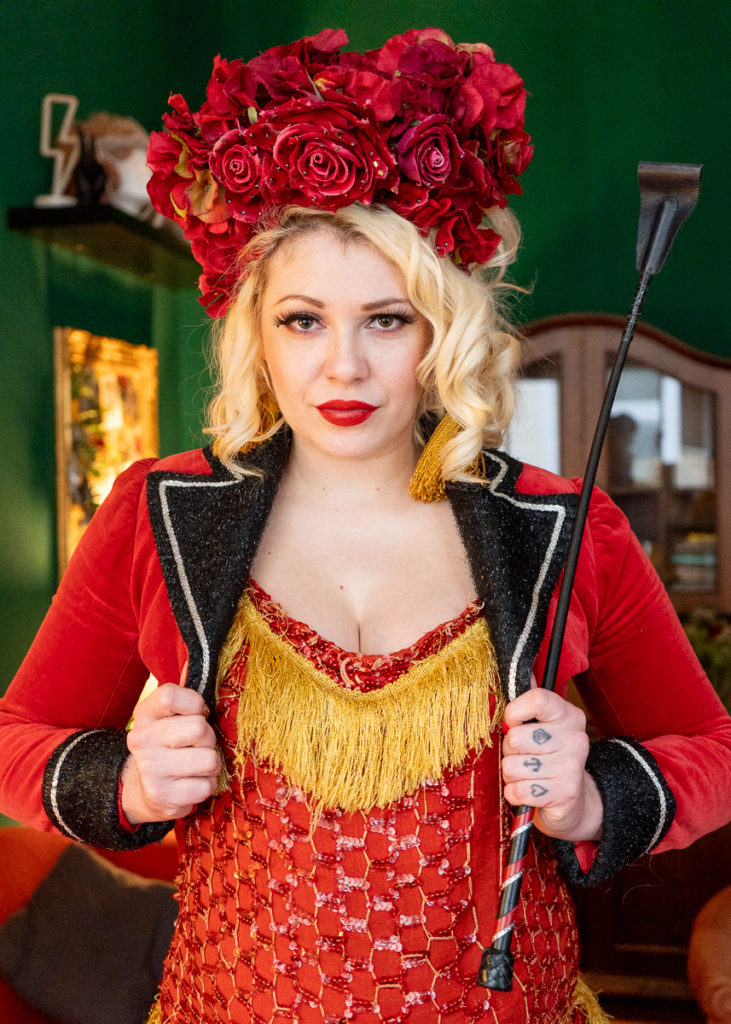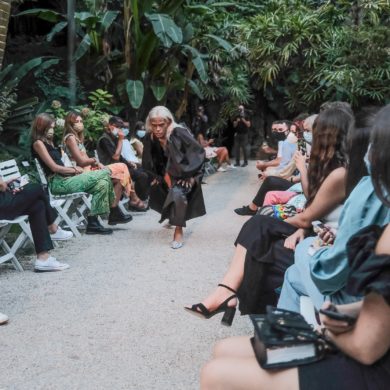Live performance art has been one of the hardest hit artistic mediums throughout the coronavirus pandemic. Performance artists play a significant role in creating the nightlife and culture that Berlin is known for – the culture that makes Berlin, Berlin. Now in lockdown, these artists are left without jobs, and without stages. Berlin Offstage offers us a glimpse into the current experiences of Berlin’s performance artists – their hardships, their ideas, their tenacity, and their fears. Photographer Aja Jacques has spent the past three months visiting fourteen artists in their homes to both interview and photograph them for this project. The following are selected excerpts from 7 of these encounters.
for more: berlinoffstage.com – @berlinoffstage
Aja’s work: ajajacques.com
Fifi Fantome
She/her – Performance artist – @fififantome
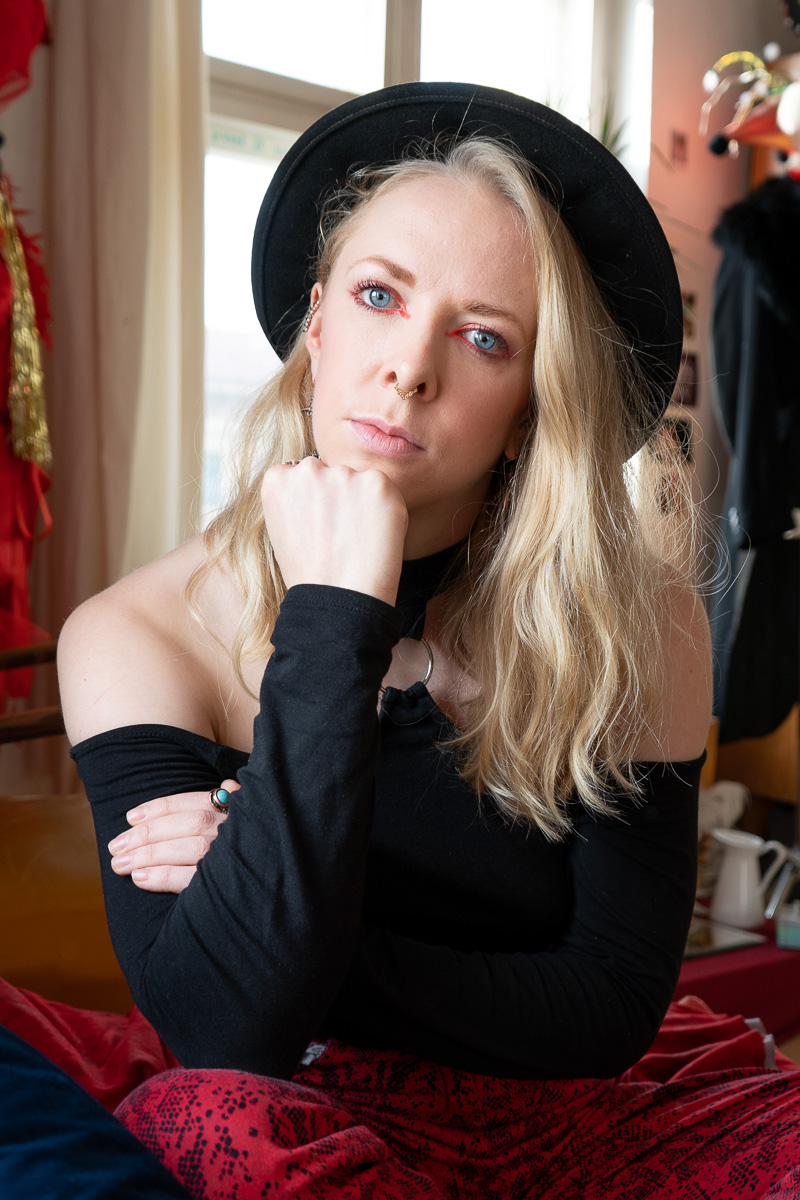
Berlin is such a vibrant city… There was such a vibrant scene of art, and you could see art in so many different aspects and forms and whatever style you want to see. You could see really weird things that I’ve not seen anywhere else in the world… I’m scared that this will die. I just don’t think the city will return to where it was before. All these clubs and shows and venues and artists are going broke.
I really love live performing. I think there is so much that you get as an audience and as a performer. I miss the adrenaline. I miss the stages. I miss looking out to a sea of faces and seeing their joy, or their pain, or their sadness, and what that brings to me and what that brings to them. How powerful it actually is. How much you can do with it and get out of it.
I miss the adrenaline. I miss the stages. I miss looking out to a sea of faces and seeing their joy, or their pain, or their sadness, and what that brings to me and what that brings to them.
The hardest part has been feeling like I don’t matter. In the first lockdown, everyone was at home consuming so much art, they were listening to music, watching films, they were watching live streams to deal with their boredom of having to stay in the house. Then at the same time all these artists are like ‘Hey folx, we provide all these things to you for free, it would be cool if you could support us’… worldwide there isn’t this recognition of how important art is to people, and how much it heals and brings joy to people. So this was a big struggle – to feel like the world consumes everything that we as artists give them but doesn’t care about us, or say that we’re valued.
I think the general public maybe doesn’t understand how much artists are struggling, not just financially, but emotionally and mentally right now. How a lot of us live our lives is being totally taken away and destroyed, and how we deal with our trauma is also being taken away. There are just so many layers of how we are struggling right now that people don’t see.
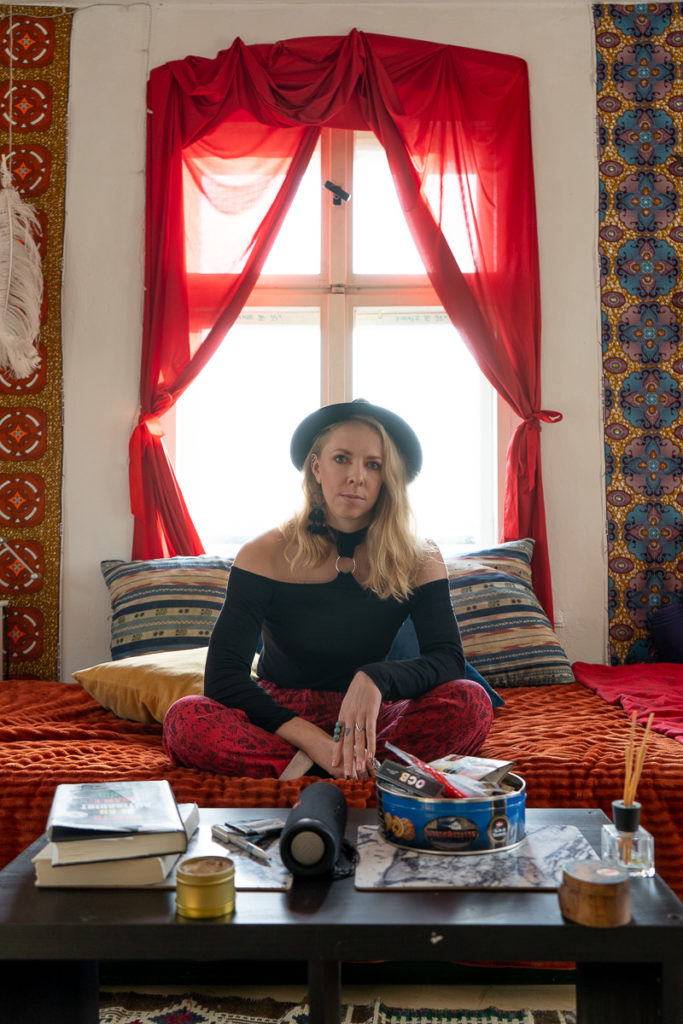
Very Confused
Mona – Performer and visual artist – @iam.veryconfused
out of drag – she/her, in drag – It, This, The fuck is this?
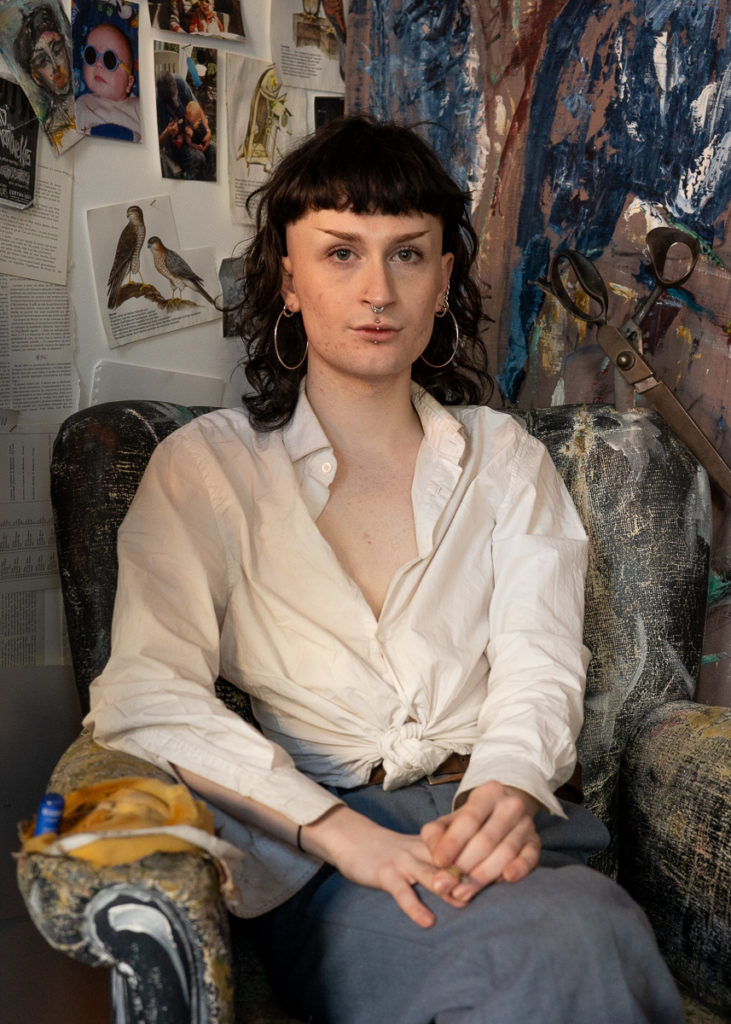
It’s quite affirming in a way this lockdown, to look after yourself. You are forced to concentrate on every part of you, because you’re hanging out with yourself for lockdown. So you have to affirm the best, worst and weakest in yourself, which is very healing.
It’s a very healing part of drag, becoming someone or something else that’s a part of you. It allows you to process parts of you. It’s part of my therapy, now being taken away from me.
I miss becoming my character. I miss the feeling of the process, putting the makeup on, changing the shape of my body, absorbing the character, and having the 10 seconds before going onstage and you meditate very quickly and then go and it happens… It’s a very healing part of drag, becoming someone or something else that’s a part of you. It allows you to process parts of you. It’s part of my therapy, now being taken away from me.
During this whole lockdown time even if we couldn’t be creative, I think I was always on my computer thinking utopia, create a show in case it happens. Carry on massaging the baguette so you’re sure it’s going to be a good baguette at the end. It gave me a lot of fuel but mostly an angry one. It made me more aware of my powers of what needs to happen and how my voice can be heard, and how my voice can create movements within the outside world. I realized how much more power I have and how I want to use it.
I feel like at this time I think we all feel quite broken. Emotionally it’s quite hard for me to interact or give energy to people, because I have none to give to myself at the minute. That’s the thing of: when is it going to come back, and how am I going to be able to fill this cup which is empty, if the situation which is taking all the energy out is going to carry on for while?
We are all in so much pain and we are all so hurt and walking with a broken heart next to each other. It’s very dramatic to say this, but I see it this way.
Ixa
She/her – DJ, drag performer, and performance artist – @ixa_psyborg
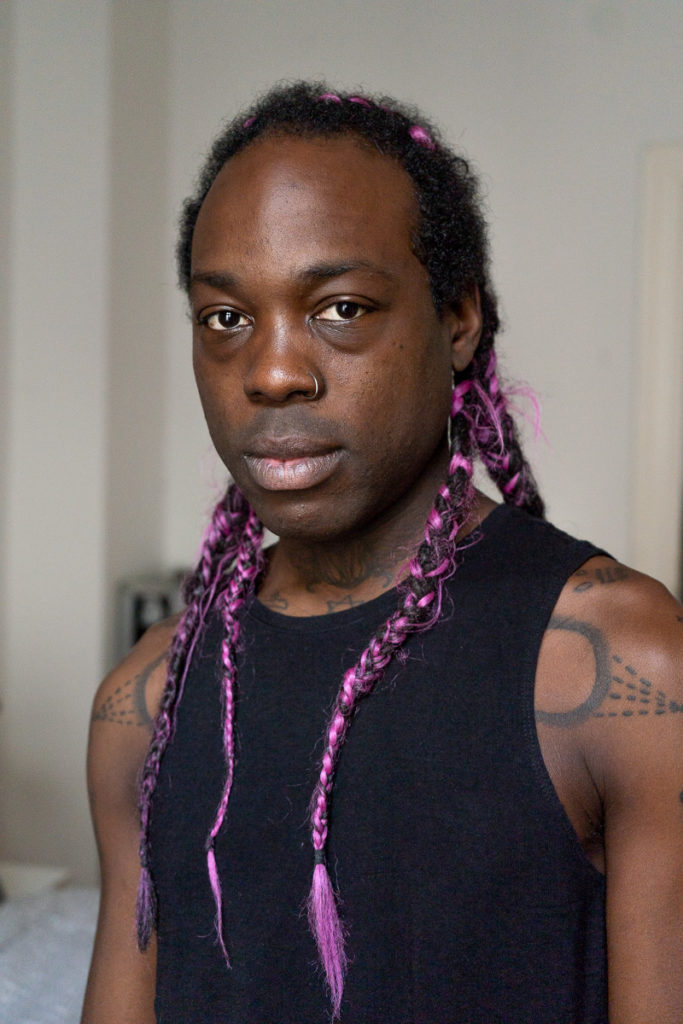
I really miss the culture around being a performer and being able to engage in that.
I did kind of enjoy the vacation at first, but as a performer I was limited to streaming, which I quickly discovered was more difficult to get into and to say what I wanted to say versus performing live. Once that started to set in, I kind of had a feeling of: what am I going to do with my work or my brand? How am I going to move forward if there isn’t stuff to do live or in events? I eventually started to find the momentum of creativity, and finishing artistic projects that I had started… I guess to offset how it feels not knowing when things will open up and what’s going to come next, I’ve been really focused on being productive creatively, because as long as I’m doing that it keeps my mood up.
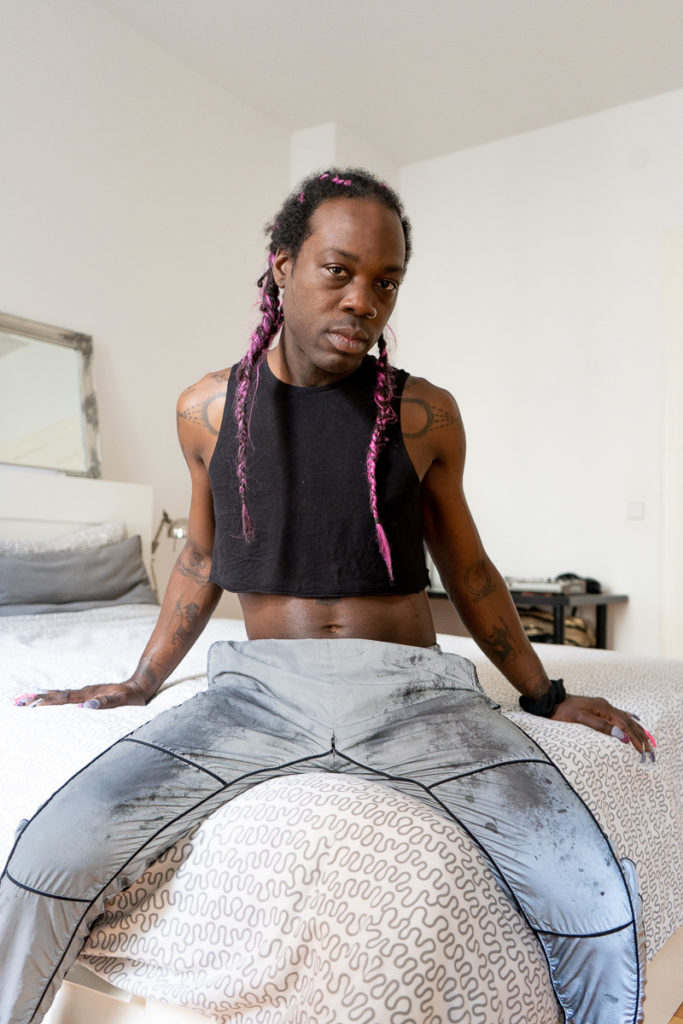
The first few months [into lockdown] before stuff started to open again, even without the club scene, you could still tell Berlin was Berlin because the culture here is so strong and the personalities that come with it are so strong. It existed without having the clubs to go to all the time, which I thought was really cool. A lot of that was the support and people trying to help each other get what gigs there were, and the streaming platforms that created spaces for DJs and performers to do stuff.
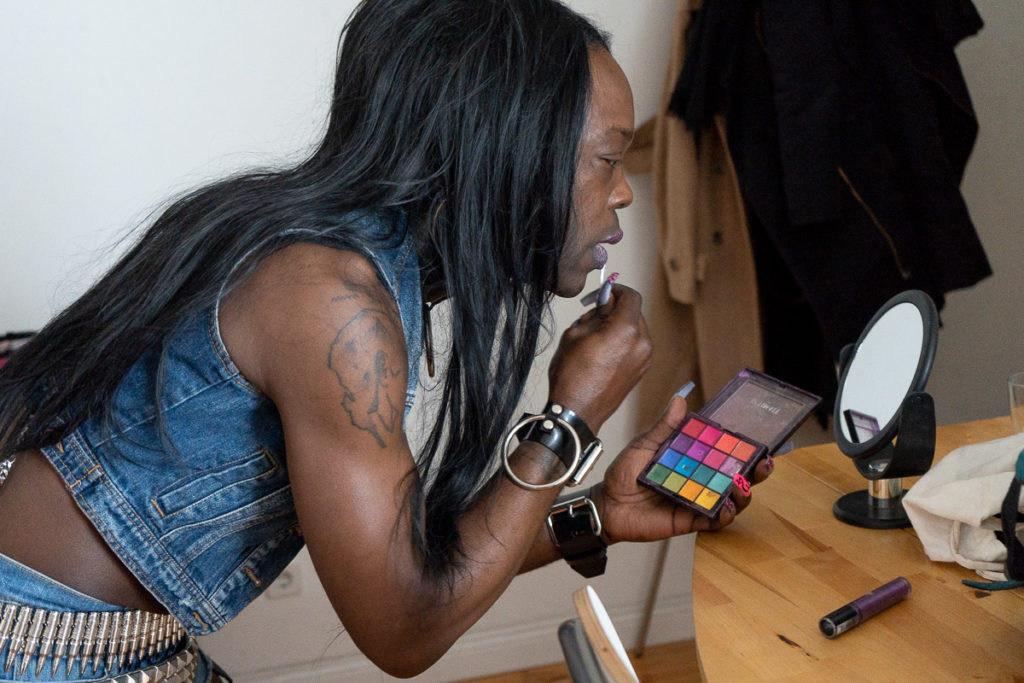
My fear is that the infrastructure that nightlife is based on, that feeds into performance culture here [in Berlin], would collapse.
My fear is that the infrastructure that nightlife is based on, that feeds into performance culture here [in Berlin], would collapse. That the financial institutions come into such hardships that they start to only have to think about funding the most essential things, which… the arts is usually is high up on the list of things to get cut first. This city being the haven that is was won’t exist in that way anymore. This is something that we’re already struggling with, with the gentrification that occurs here.
Buba Sababa
any pronouns – Drag king and costume designer – @buba_sababa
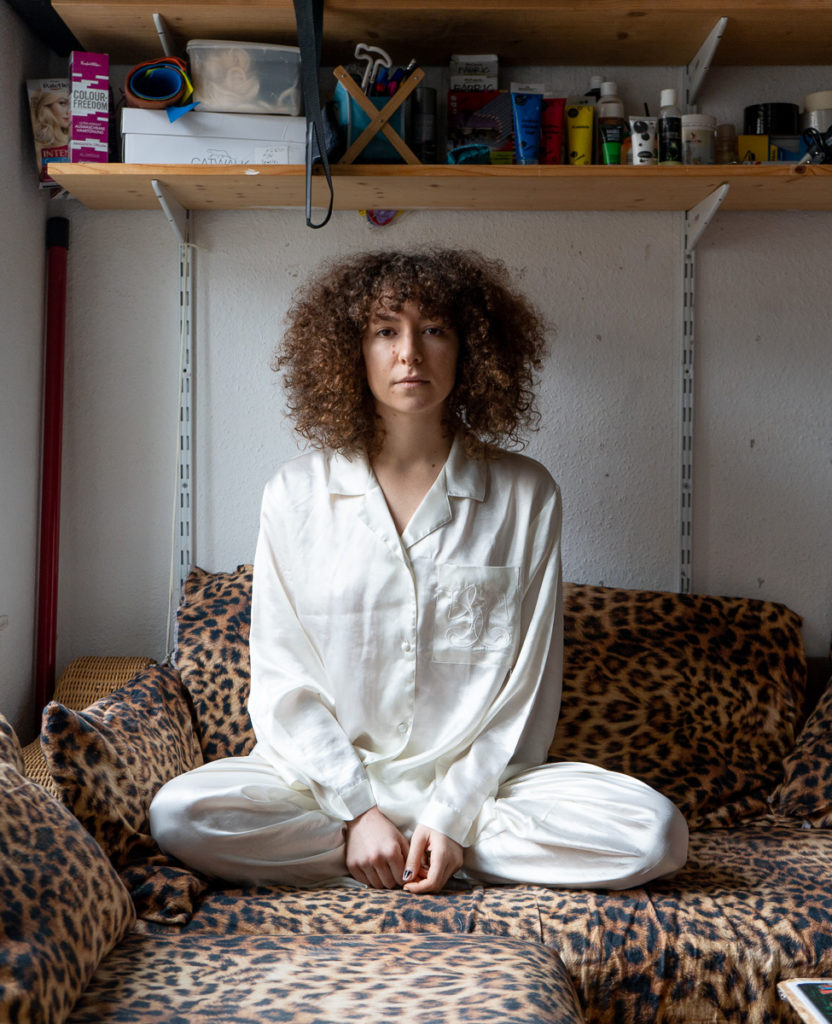
The thing I miss the most about performing is the crowd, for sure. Something that the livestream doesn’t give is the crowd, a massive crowd, a lot of people screaming together. I miss it so much. I finish an online show and I feel empty. I don’t know, was it good? What’s going on? Where’s all the people? Where’s the bar? What’s going on? I don’t know, I don’t feel the message. Drag is a very political act and I don’t know if it works [in livestreams]. You don’t get feedback.
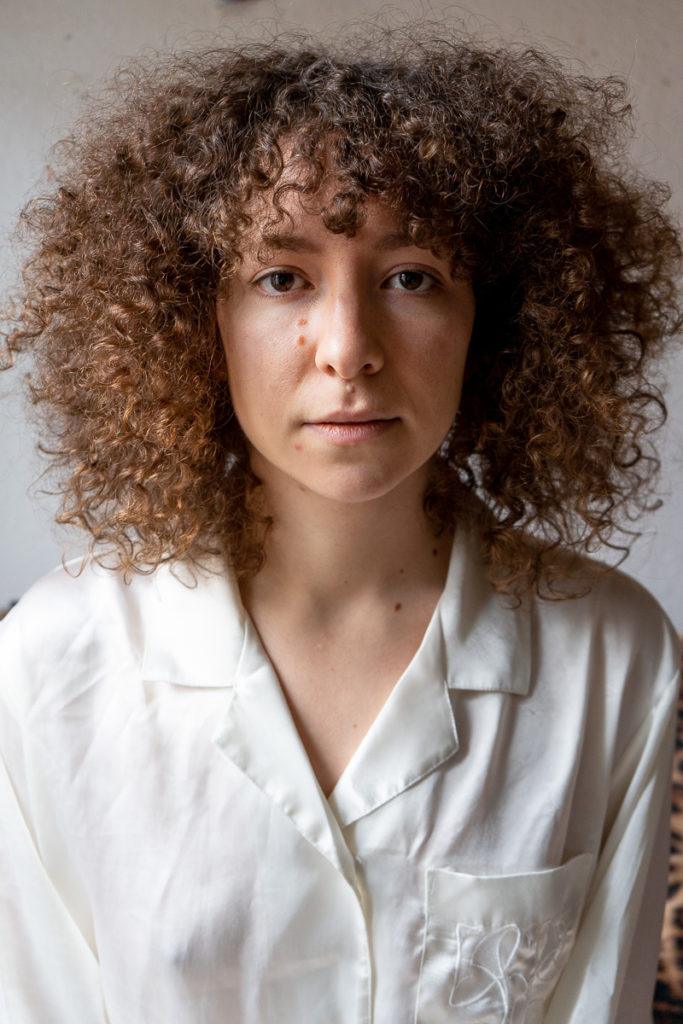
What is Berlin? It’s the queer people. It’s the queer scene
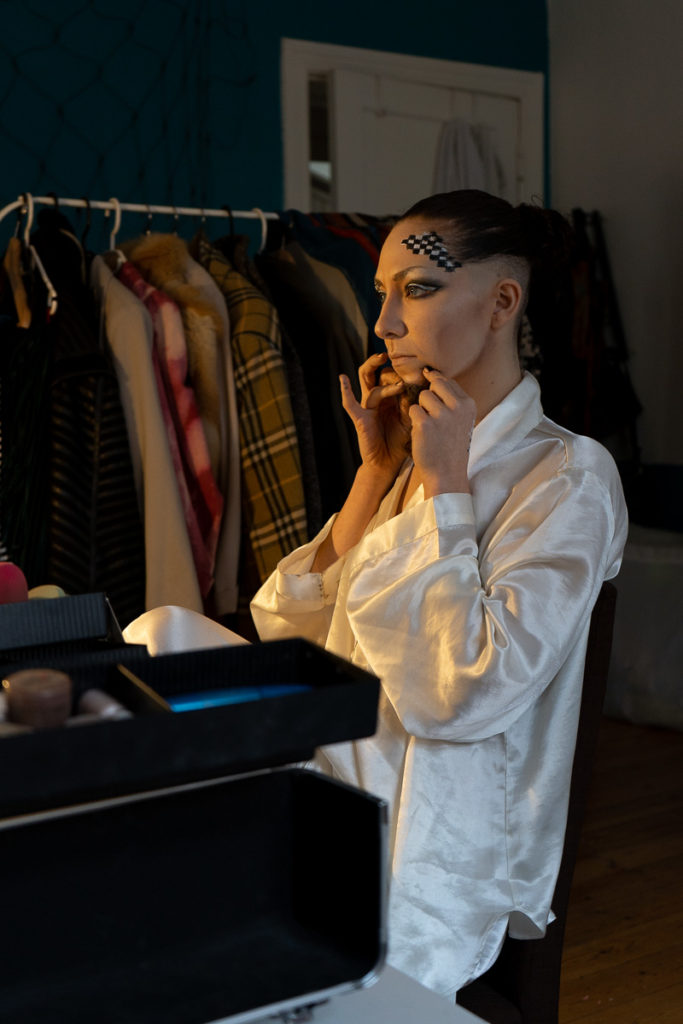
What is Berlin? It’s the queer people. It’s the queer scene here, it’s the queer community. The party and the bars and the fact that it’s open non-stop. Everyday there is a drag show, everyday there is a party, everyday there is something. This is the first time for a long time that there is no rave. There is no option to do it. All this is what makes Berlin special. I’m afraid about this with Berlin, because if there is no queer scene here, there is nothing here.
This is our job, [to keep the queer scene in Berlin alive]. We need to push and do stuff as much as we can. A big part of Berlin is that there are no rules. No one holds us. Now the government holds us much more with not being allowed to go out and do stuff. Yes it’s corona, it’s a difficult situation – I don’t think that we don’t need to be in lockdown. But we still need to break the rules a little bit, because this is what keeps Berlin alive.
Create art non-stop. You are at home, so this is a perfect time to create stuff that’s going to come after. Dream big and then make it after.
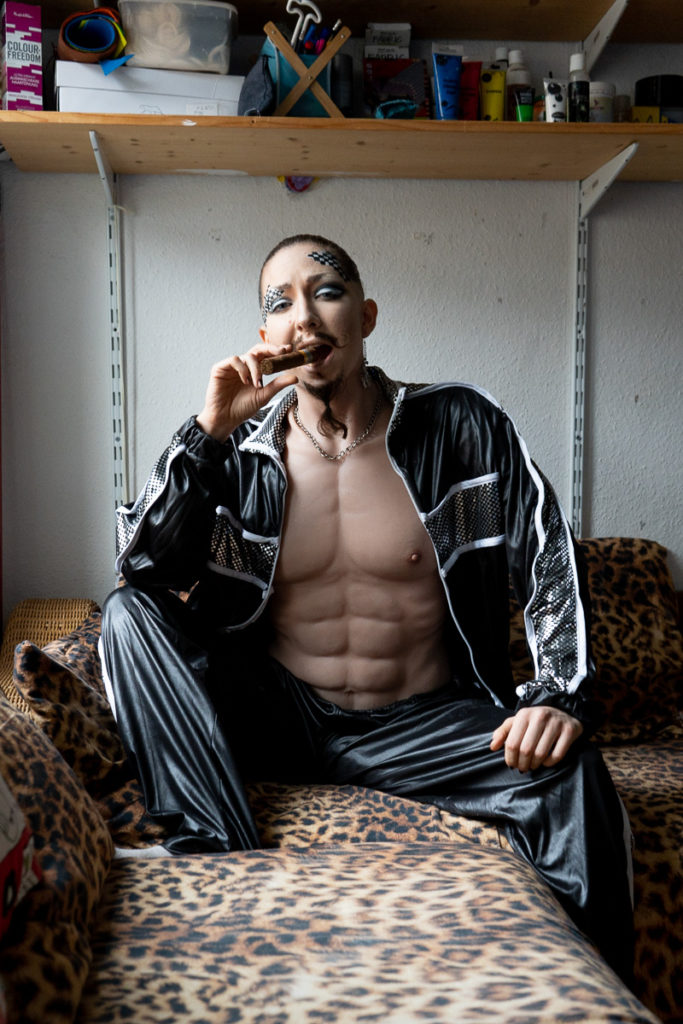
Antina Christ
She/they – Drag performer and makeup artist – @antina_christ
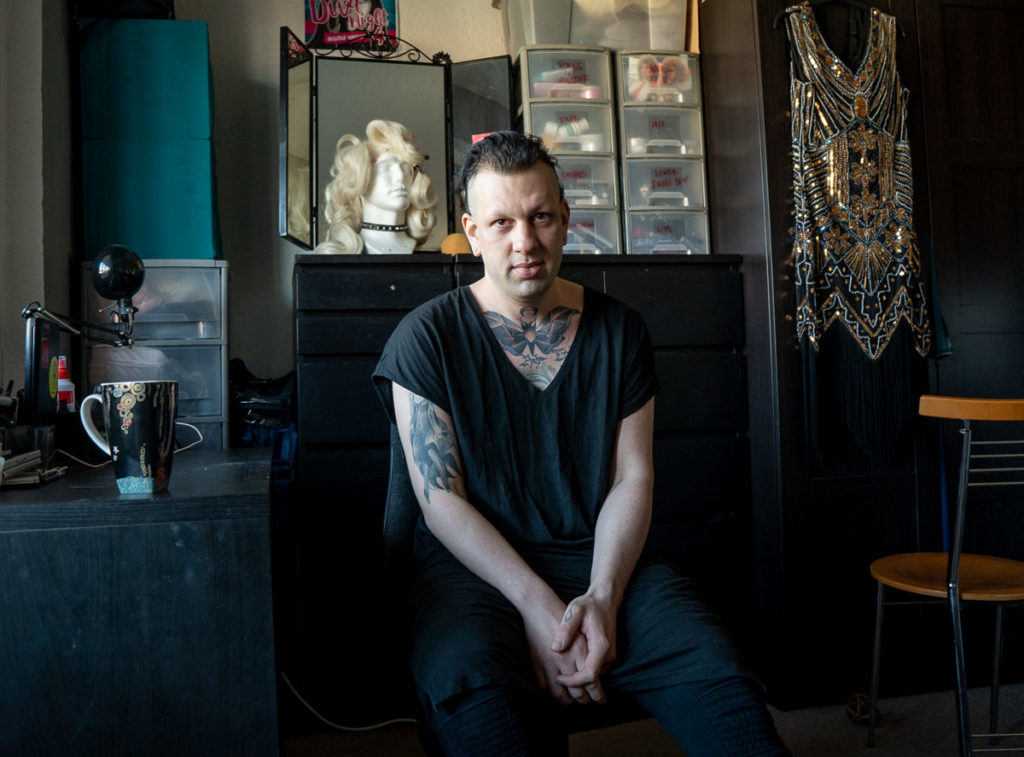
Of course I miss full on performing, it’s the best, to go crazy, to see other performers, to talk with other performers. I miss that quite often. I love the backstage.
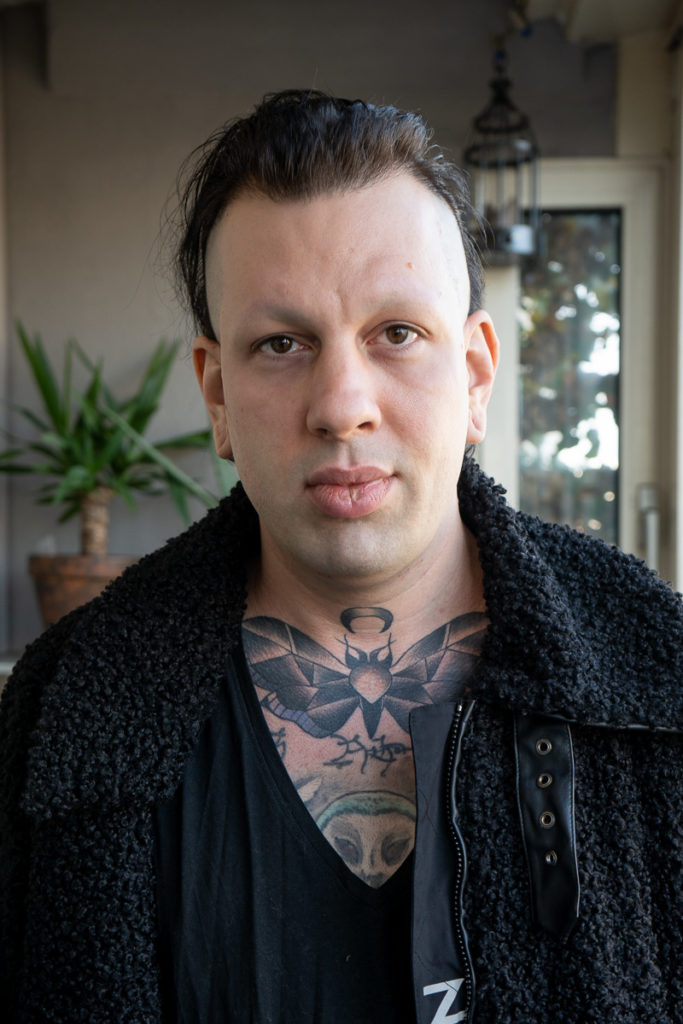
[At events] people sometimes come to you for advice, and I’m not educated to give any advice, but sometimes it’s simple stuff that an elder queer person gives to a younger queer person. That’s just about life experience. That’s something I really miss.
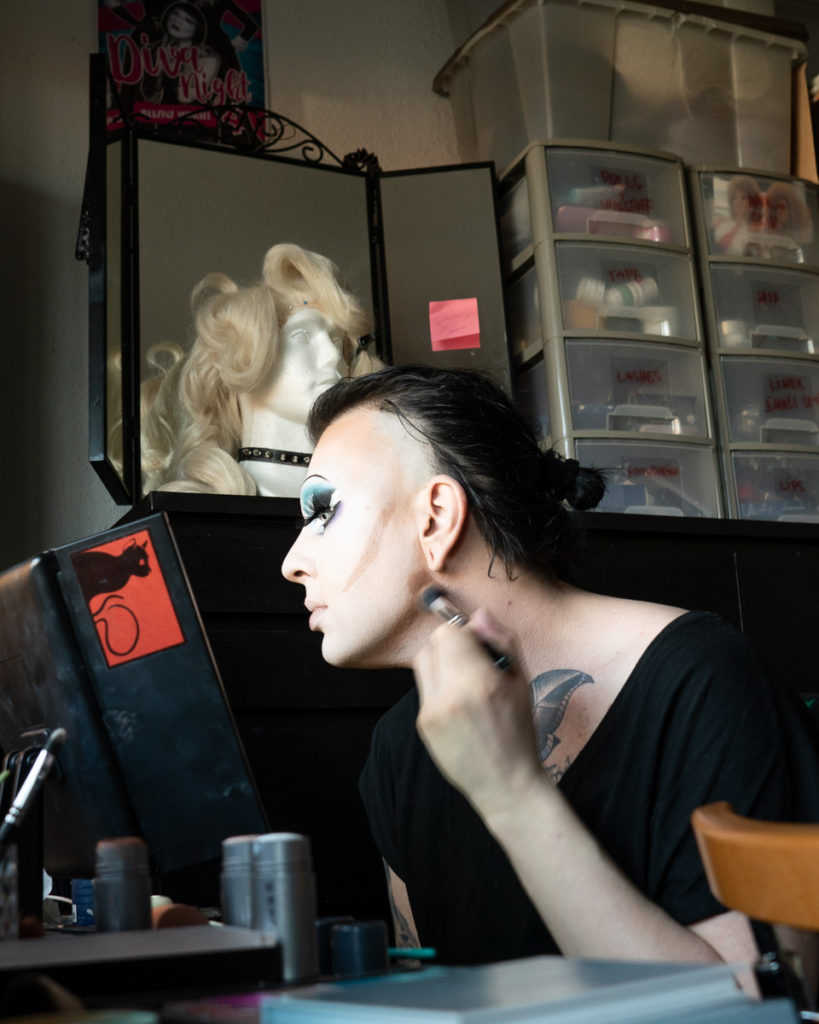
I think it’s unrealistic to think that queer culture and alternative culture will not change through this. This is always something that is niche, and because of this niche thing all those companies and clubs are always on the limit of financial crisis. If something is mainstream, there’s someone that goes there all the time and pushes money in there. There isn’t this fear of losing it. But something that is always on the limit financially, it will get very affected, even before the crisis. That’s what I’m scared of.
The hardest part of the corona crisis is not being sure what the future brings… Not just for myself but not knowing what the future brings for others. Where is this going? If all the clubs are closing, if all the small and independent companies are going to close, then what is left? Just the people that have money and the people that care about capitalism, and not the people around them. I don’t want to be a negative Nancy about it but yes.
I’m just hoping… that we also as a community are able to build ourselves up again and rise again.
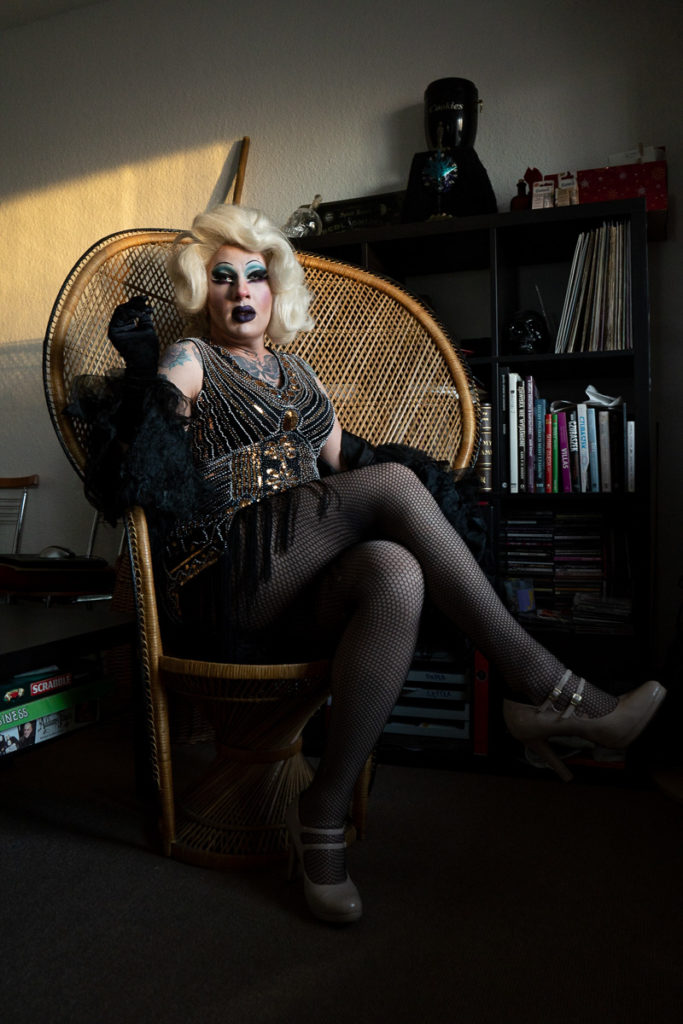
I’m just hoping… that we also as a community are able to build ourselves up again and rise again. We’ve always done that in the last decades and centuries. It’s going to happen again. In the end of the 20s Berlin was a thriving queer crazy community and culture. It was ending but it came back. I think there has to be something in the air here.
Gutter Gucci
Riley – they/them – dancer & performance artist – @guttergucci
I think the thing that scares me the most is that there’s no dance classes, and that I can’t keep progressing in the way that I want to…. It’s like, I’m losing time or something. I feel like I’m missing out on time where I could be learning faster and learning more and making more gains in my movement. It’s definitely the hardest part, when the dance studios close. You really can’t train at home. There’s not enough space.
I miss all of the ways that you used to engage with performance… I miss that vulnerability that comes with touch in performance and proximity in performance. And I don’t know when there’s gonna be a version of the future again where it’s possible to engage with these elements.
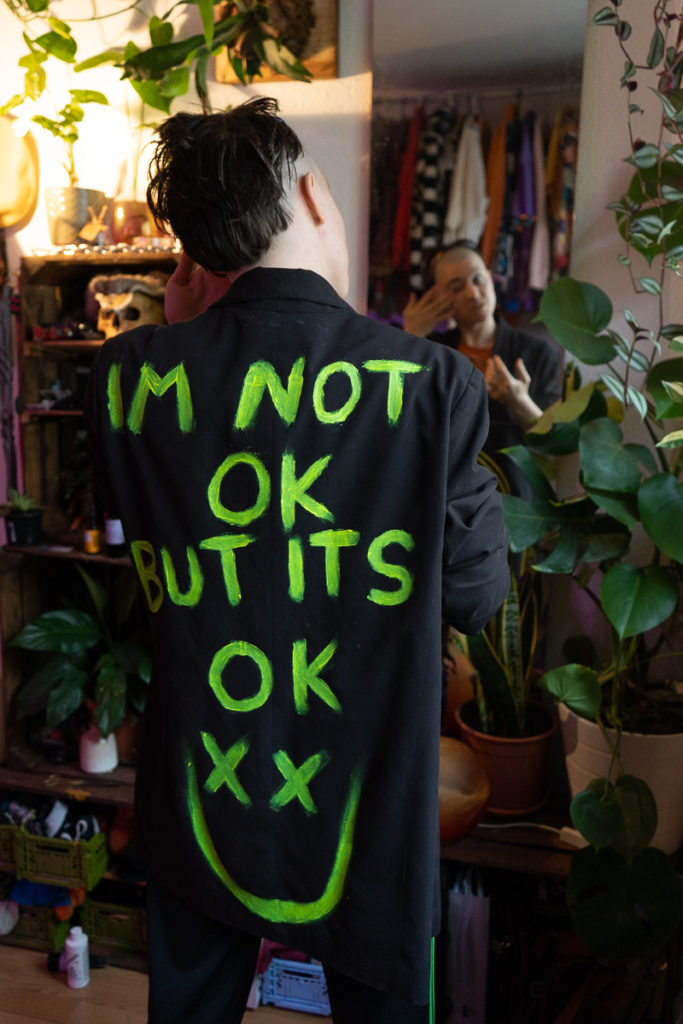
It feels like at this point to make long-term goals, is almost in disservice to myself. Because they’re going to have to change and they’re going to have to adapt. And I don’t want to be hard on myself when I can’t meet them because of this situation that’s happening now. I’ve got personal growth goals that I get to focus on now. That’s cool. But career goals? I’m like, ‘Lol, what?’ I don’t have them anymore.
Which is also, you know, kind of exciting. It’s pushing me back into this place of like: You have to be present. There is no other choice. Be present or be uncomfortable. I’m like, okay. I’ll do a little bit of both! A lot of both, actually.
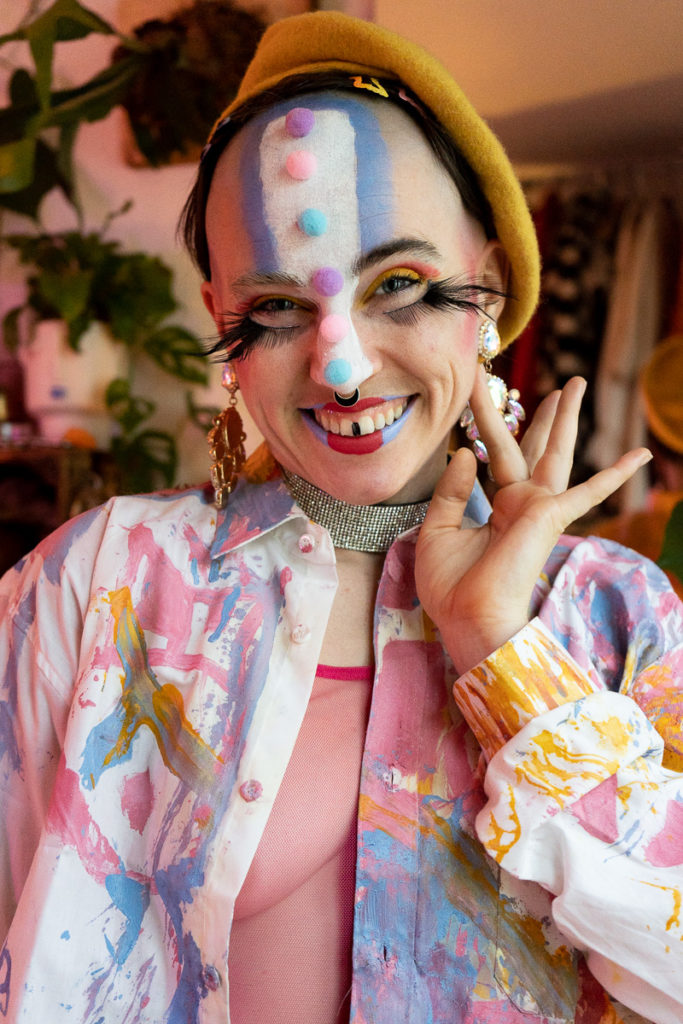
I feel like there’s a lot of power that be gained in this immediacy, in this focusing of: what is here right now? And what can I do right now? These conditions sort of force you to work on that. Which is ugly and beautiful.
Art is not an add-on. Art is not an extracurricular, art is not some sprinkles on your cupcake. Art and culture are a huge part of the reason why we exist, how we experience joy, where we find beauty.
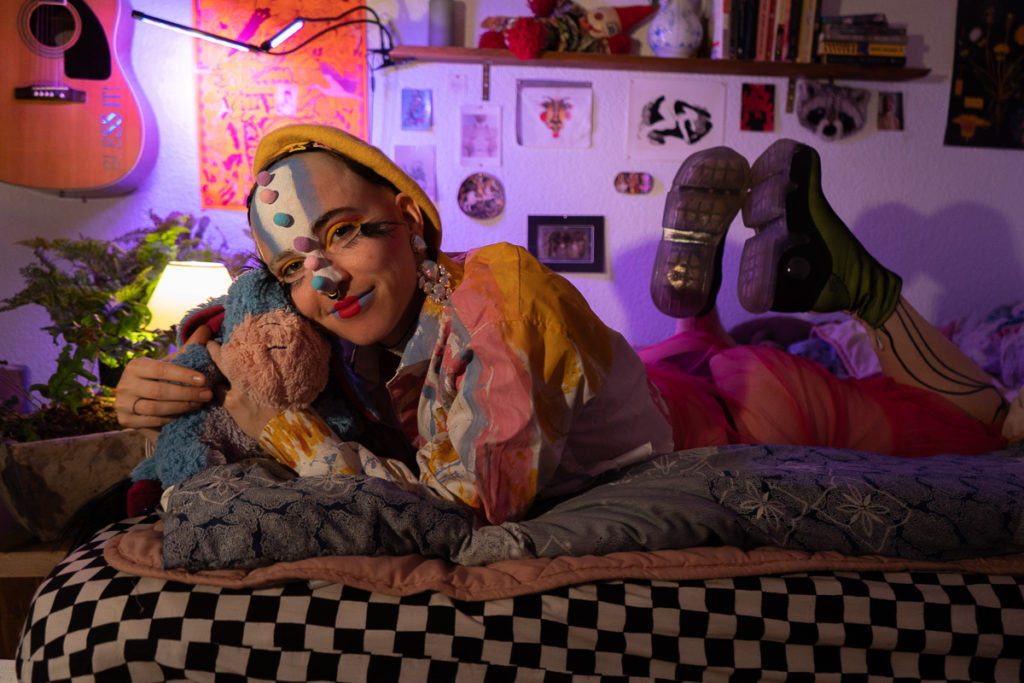
Julietta La Doll
She/her – Freakshow/Sideshow Performance Artist – @juliettaladoll
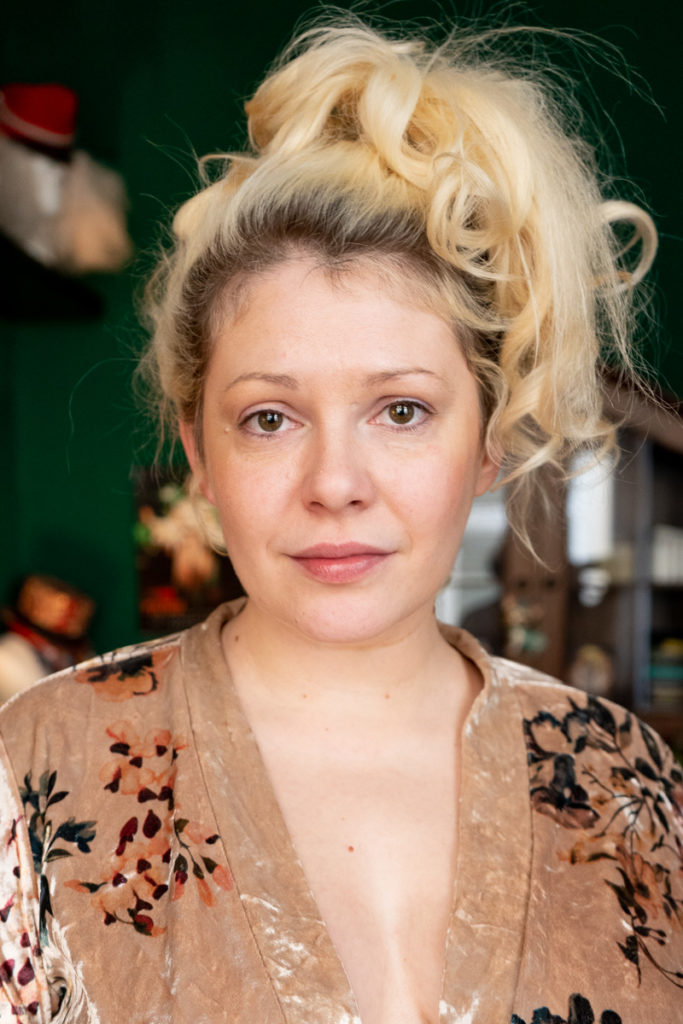
I’m missing the stage, I miss the thing I have passion for, the thing I am burning for. I miss all of this that no money in all the world could pay for.
It’s not like I’m doing my art form for other people, but I like to present the results of what I’m creating to other people, because I feel like I’m growing from the interaction with the audience. It’s not that I’m creating for them – I’m creating still for myself, but I’m showing them and my art is evolving. If I’m just creating for myself at home, I’m stuck somewhere.
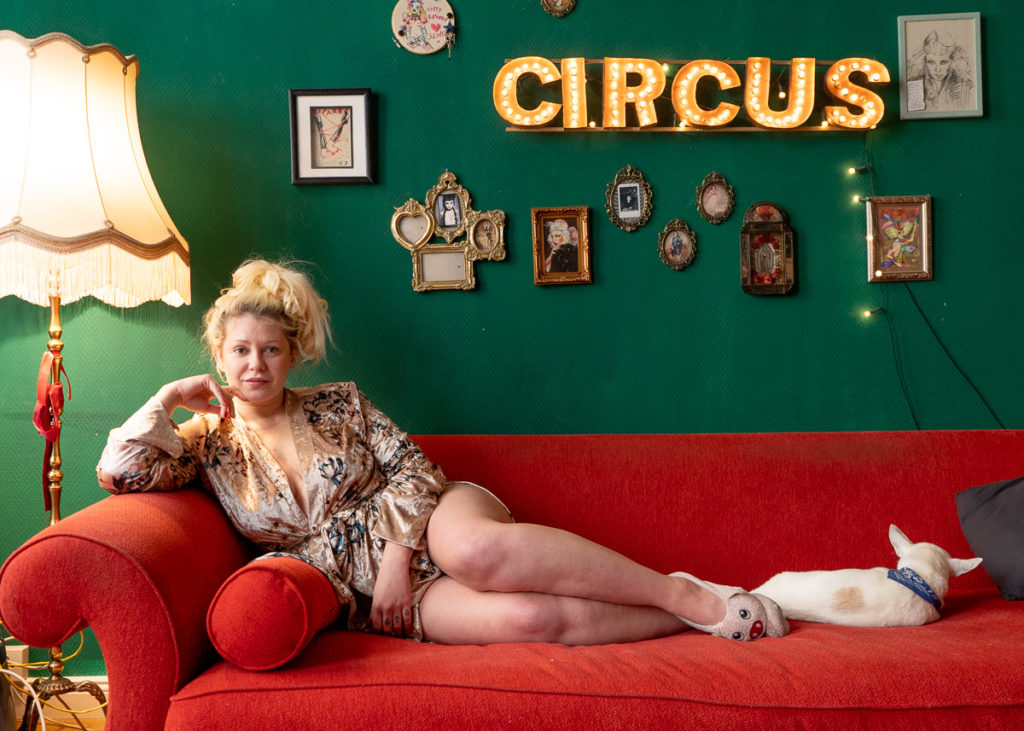
I’m afraid of losing more people than we already did, because some people don’t have the support system. I know there are people that feel like it’s never going to end, and they don’t know how to survive, and there are missing resources. They feel bad asking for help. I can relate because I can be like this, and I’m afraid of losing more people along the way because we already lost quite a few people and artists. It’s really emotional for me. I know I have resources and support in my network to make it but… there might be someone who we don’t even realize is struggling because they seem so strong, they seem safe, but I think those people often have the biggest problems reaching out for help. This is what I’m worried about the most, especially in these dark winter months.
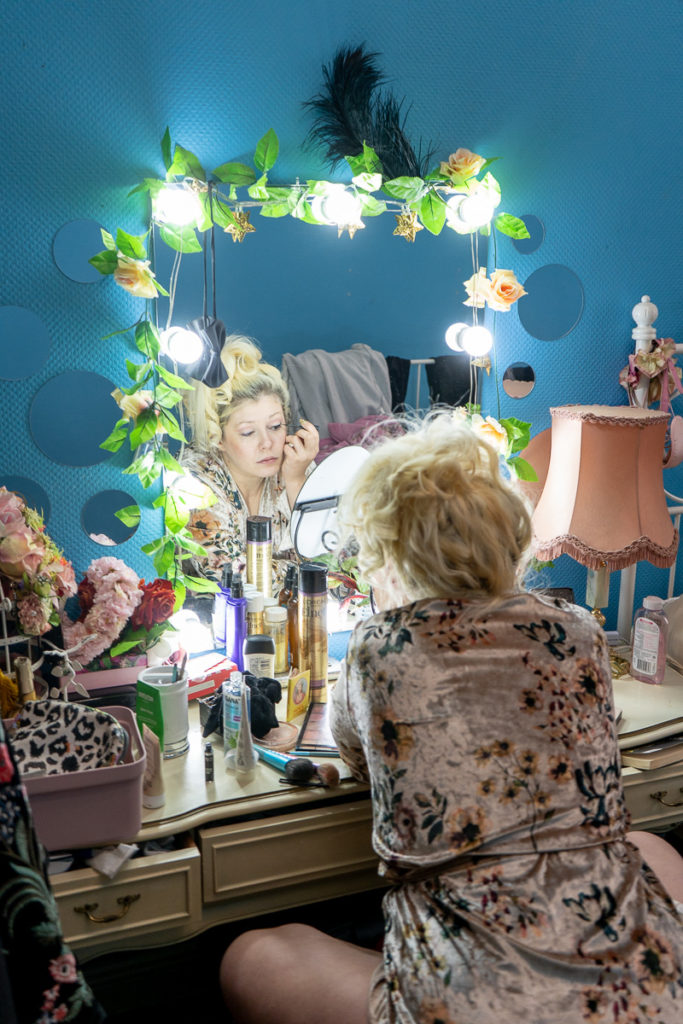
I think compared to other cities in this world we are very lucky to be here in Berlin, and of course it’s a situation that no one has dealt with before. We can’t expect that [the government] makes no mistakes at all. I just wish our voices would be heard more.
I think people need to realize more what the world would be without arts. Some artists are put into this field: ‘it’s just a hobby, they are amateurs’. But so many people enjoy art sometimes without even noticing it. People should just listen to us. More action, less words. Actually – more words and more action.
All of the artists involved in this project were a part of Overmorrow, an immersive art exhibition that ran at Wilde Renate from July through October 2020. Conceptualized by Bad Bruises, the project was co-organized by Bad Bruises, Trash Era, and Wilde Renate, and also featured takeovers from other local collectives, including Venus Boys and Berlin Strippers Collective. Overmorrow provided a performance venue and a supportive community for over 100 local performance artists, 70 of which were steadily employed by the project. The project was a great success, delighting audiences with corona-safe experiences and paying over 100 000€ to local artists, before it was forced to close at the end of October.
View more of this project here: berlinoffstage.com or @berlinoffstage


